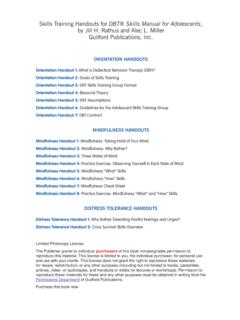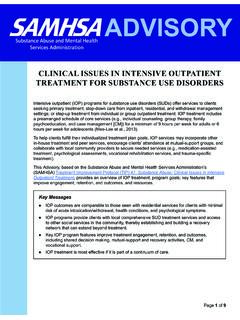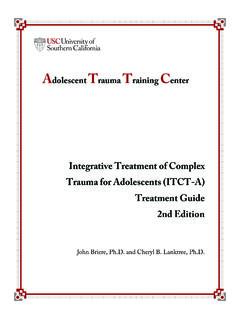Transcription of Psychosocial Rehabilitation Program Group Descriptions
1 Psychosocial Rehabilitation Program Group Descriptions 12 Step Recovery: An introduction to 12-step recovery and abstinence-based living. Group members will receive education about each of the twelve steps and what working them looks like. An opportunity to do step work (homework) will be offered for those interested. Group will include recovery tools and skills for newcomers to 12-step recovery, as well as for those with significant dry time , but who feel they are stuck or stagnant in their recovery. Alternative Wellness: The Group will cover the benefits of using music, exercise, and meditating/focused thought to cope with mental health symptoms. Some groups will be hands on and some will be informational. Activities will include: music, meditation, yoga, and other types of soothing/invigorating activities. Anger Management: This Group will cover highly, effective approaches to understanding and controlling anger including pragmatic tools for day to day life.
2 Each consumer will be able to tailor a personal Program to practice Anger Management coping skills and discover a deeper understanding of how anger affects all areas of life - both physically and mentally. Conflict resolution techniques and considerations will be covered as well. Anger Management for Substance Abuse and Mental Health clients Workbook by SAMHSA Animal Therapy: The purpose of this Group will be to help clients overcome social anxiety, grief, depression, and feelings of loneliness with the help from a nonjudgmental source, who happens to have four legs and a wagging tail. Anxiety: Breaking Free: This Group will introduce consumers to a variety of techniques that will teach them to understand and cope with the many aspects of Anxiety. There will be a specific focus on how anxiety leads to procrastination and what can be done to break this cycle. The Group will complete exercises from The Procrastination Workbook by William Knaus, and will also use The Worrier s Guide to Overcoming Procrastination by Pamela Wiegartz, and Kevin Gyoerkoe, as a resource.
3 Art and Recovery: Art helps individuals express a full range of feelings through different media. This Group offers chalk art pastel, charcoal pencils, colored pencils, watercolor and more. We will create projects for personal use, and you may also provide your one-of-a-kind creations to the Pioneer Art Gallery as well as other galleries in the community. Back from the Bluez: This Group is designed to provide you with information about depression, and it suggests strategies for how you can manage your mood. It is organized into modules that are designed to be worked through in sequence. Topics will include: An overview of Depression, Behavioral Strategies for Managing Depression, The Thinking-Feeling Connection, The ABC Analysis, and Unhelpful thinking styles, Exploring ways to examine and challenge unhelpful thoughts, core beliefs and self-management. Sources: Center for Clinical Interventions, The CBT workbook for Depression and Your Depression Map.
4 Book Club: Boundaries: This Group is designed to assist in recognizing and learning about boundaries in clients lives. This Group is designed to have clients explore areas of their life: physical, mental, emotional, and spiritual. The Group will explore these areas and learn what a healthy boundary is and how to create these boundaries in their lives. This Group will be working from the book, Boundaries by Dr. Henry Cloud & Dr. John Townsend. CBT: Suicide Prevention: This Group focuses on helping individuals who struggle with suicidal ideations and suicide attempts. CBT techniques are utilized to guide clients through their own narrative to help identify under developed skills in order to create adaptive coping skills and safety plan. This Group will utilize Choosing to Live by Thomas E. Ellis and Cory F Newman. - 2 - Community Inclusion: This Group is designed to help consumers plan and enjoy activities to engage in and connect with their community.
5 Consumers will be encouraged to take the needed steps to integrate back into their community. These activities provide the opportunity for consumers to develop social skills, relaxation skills, and hobbies to help battle boredom in an in-vivo (real-life) setting. Topics will also include employment, civic engagement, housing, education, recreation, and spirituality. These activities will mostly take place outside of Pioneer Center, but occasionally peer support/socialization or educational activities will be planned at the center to help reduce social isolation and promote recovery. Consumers will also have opportunities to problem solve new areas to be addressed through committees or organized meetings. Consumers who are nearing their end of PSR treatment will be required to take this Group . Conflict Resolution: This Group is designed to assist in developing skills to resolve conflict. Techniques are based on learning to jointly resolve conflict rather than taking a competitive win /lose approach.
6 Co-Occurring Addictions & the Body: This Co-Occurring Group will be providing education in The Science of Addiction- Drugs, Brains, and Behavior. The material presented will focus on understanding the effects of substances on the body and brain. All material is evidenced based from National Institutes of Health, NIDA National Institute of Drug Abuse. Co-Occurring Addictions & family : Families are an important part of recovery for their loved one s Recovery with a Co-occurring mental health disorder and substance abuse disorder. Sessions will focus on understanding issues that occur when people grow up and live in families with serious problems (such as addiction and mental illness) and over time family members develop unhealthy ways to cope with these diseases. Co-Occurring Bridging the Gap: This Group meets weekly to discuss methods and techniques of substance abuse relapse prevention. The Group will focus on how to stay stable while working a Program and how substance abuse can affect mental health.
7 Co-Occurring Co-Dependency: This Group will focus on understanding and changes with codependency, the stages of development, as well as the warning signs of codependent behaviors. Additional topics that will be discussed will focus on addiction and codependency that develops, family and codependency as well as recovery skills for breaking the cycle of codependency and addictive behaviors. Focus will be in providing evidenced based material by Melody Beatty, using her book entitled, Codependency No More , as well as worksheets and role play exercises. Co-Occurring Harm Reduction: This Group focuses on making a commitment to reducing harm, particularly substance abuse, promoting health, and improving the quality of life. This Group can also be utilized by individuals to engage in other high risk behaviors such as self-injury, other addictions, sexually inappropriate behaviors, etc. The Group will complete exercises from the Holistic Health Recovery Program Workbook by Yale University School of Medicine Division of Substance Abuse.
8 Co-Occurring Living In Balance: This Group is an evidenced-based curriculum that is tailored to the substance abuse/co-occurring population. This Group utilized education and exercises that focus on Group process and interaction through discussion and role plays, strengthens neglected areas of life, and teaches relaxation and visualization techniques. This Group will utilize the Living in Balance Curriculum by Hazelden. Co-Occurring mindfulness : This Group will provide clients with an introduction to mindfulness techniques that can be utilized to help manage symptoms of substance abuse and mental health. clients will learn to identify triggers and when to implement techniques in order to maximize success of the techniques. Co-Occurring Seeking Safety: This Group is an evidenced-based approach that assists clients who have a history of significant trauma, particularly with PTSD, and substance abuse. The goal of the Group is to establish safety by working towards discontinuing substance abuse and gaining power over symptoms associated with trauma.
9 Resource: Seeking Safety by Lisa M. Najavits (Limited Enrollment) - 3 - Coping With Depression: This Group will meet weekly to address everyday stressors that can attribute to depression and feelings of sadness. The purpose of this Group will be to learn how to recognize and handle those stressors in a positive and healthy manner. Coping with PTSD: This Group examines the effects of trauma on individuals on a biological and psychological level. Group members will be able to identify their individual triggers. Techniques will be introduced to lessen the severity and frequency of symptoms. Critics Review: This Group will provide an opportunity for the participants to use their critical thinking skills by viewing, analyzing, and interpreting various forms of media and literature pertaining to mental health recovery. The Group will focus on holding appropriate discussions, expressing individual opinions, and maintaining constructive debates regarding the week s topic.
10 The goals that will be addressed include: critical thinking, socialization, advocacy, assertiveness and creative expression. Effective Communication: This Group will focus on building skills to effectively exchange information, feelings and meaning through the use of verbal and non-verbal communication. The elements of communication will be broken down and addressed to better understand the client s position on either end of the conversation. This Group s goal is to produce a better understanding of the roles of communication, resulting in all parties obtaining the most out of the process. Garden Footprints: This Group will process utilizing plants and horticulture activities to improve social, educational, psychological, and physical adjustment of persons thus improving their body, mind, and spirit. This Group includes physical activity, relaxation and enjoyment, skill development, creative expression, sensory stimulation, intellectual and personal growth, social interaction, a sense of productivity and self-satisfaction by creating, and leaving their own footprint in the garden.



